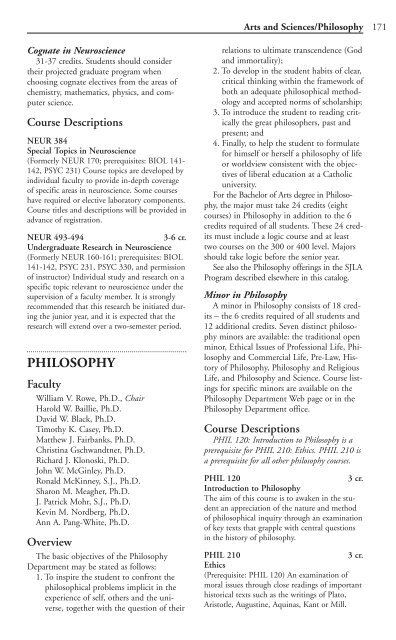2003-2004 - The University of Scranton
2003-2004 - The University of Scranton
2003-2004 - The University of Scranton
You also want an ePaper? Increase the reach of your titles
YUMPU automatically turns print PDFs into web optimized ePapers that Google loves.
Cognate in Neuroscience<br />
31-37 credits. Students should consider<br />
their projected graduate program when<br />
choosing cognate electives from the areas <strong>of</strong><br />
chemistry, mathematics, physics, and computer<br />
science.<br />
Course Descriptions<br />
NEUR 384<br />
Special Topics in Neuroscience<br />
(Formerly NEUR 170; prerequisites: BIOL 141-<br />
142, PSYC 231) Course topics are developed by<br />
individual faculty to provide in-depth coverage<br />
<strong>of</strong> specific areas in neuroscience. Some courses<br />
have required or elective laboratory components.<br />
Course titles and descriptions will be provided in<br />
advance <strong>of</strong> registration.<br />
NEUR 493-494 3-6 cr.<br />
Undergraduate Research in Neuroscience<br />
(Formerly NEUR 160-161; prerequisites: BIOL<br />
141-142, PSYC 231, PSYC 330, and permission<br />
<strong>of</strong> instructor) Individual study and research on a<br />
specific topic relevant to neuroscience under the<br />
supervision <strong>of</strong> a faculty member. It is strongly<br />
recommended that this research be initiated during<br />
the junior year, and it is expected that the<br />
research will extend over a two-semester period.<br />
PHILOSOPHY<br />
Faculty<br />
William V. Rowe, Ph.D., Chair<br />
Harold W. Baillie, Ph.D.<br />
David W. Black, Ph.D.<br />
Timothy K. Casey, Ph.D.<br />
Matthew J. Fairbanks, Ph.D.<br />
Christina Gschwandtner, Ph.D.<br />
Richard J. Klonoski, Ph.D.<br />
John W. McGinley, Ph.D.<br />
Ronald McKinney, S.J., Ph.D.<br />
Sharon M. Meagher, Ph.D.<br />
J. Patrick Mohr, S.J., Ph.D.<br />
Kevin M. Nordberg, Ph.D.<br />
Ann A. Pang-White, Ph.D.<br />
Overview<br />
<strong>The</strong> basic objectives <strong>of</strong> the Philosophy<br />
Department may be stated as follows:<br />
1. To inspire the student to confront the<br />
philosophical problems implicit in the<br />
experience <strong>of</strong> self, others and the universe,<br />
together with the question <strong>of</strong> their<br />
Arts and Sciences/Philosophy 171<br />
relations to ultimate transcendence (God<br />
and immortality);<br />
2. To develop in the student habits <strong>of</strong> clear,<br />
critical thinking within the framework <strong>of</strong><br />
both an adequate philosophical methodology<br />
and accepted norms <strong>of</strong> scholarship;<br />
3. To introduce the student to reading critically<br />
the great philosophers, past and<br />
present; and<br />
4. Finally, to help the student to formulate<br />
for himself or herself a philosophy <strong>of</strong> life<br />
or worldview consistent with the objectives<br />
<strong>of</strong> liberal education at a Catholic<br />
university.<br />
For the Bachelor <strong>of</strong> Arts degree in Philosophy,<br />
the major must take 24 credits (eight<br />
courses) in Philosophy in addition to the 6<br />
credits required <strong>of</strong> all students. <strong>The</strong>se 24 credits<br />
must include a logic course and at least<br />
two courses on the 300 or 400 level. Majors<br />
should take logic before the senior year.<br />
See also the Philosophy <strong>of</strong>ferings in the SJLA<br />
Program described elsewhere in this catalog.<br />
Minor in Philosophy<br />
A minor in Philosophy consists <strong>of</strong> 18 credits<br />
– the 6 credits required <strong>of</strong> all students and<br />
12 additional credits. Seven distinct philosophy<br />
minors are available: the traditional open<br />
minor, Ethical Issues <strong>of</strong> Pr<strong>of</strong>essional Life, Philosophy<br />
and Commercial Life, Pre-Law, History<br />
<strong>of</strong> Philosophy, Philosophy and Religious<br />
Life, and Philosophy and Science. Course listings<br />
for specific minors are available on the<br />
Philosophy Department Web page or in the<br />
Philosophy Department <strong>of</strong>fice.<br />
Course Descriptions<br />
PHIL 120: Introduction to Philosophy is a<br />
prerequisite for PHIL 210: Ethics. PHIL 210 is<br />
a prerequisite for all other philosophy courses.<br />
PHIL 120 3 cr.<br />
Introduction to Philosophy<br />
<strong>The</strong> aim <strong>of</strong> this course is to awaken in the student<br />
an appreciation <strong>of</strong> the nature and method<br />
<strong>of</strong> philosophical inquiry through an examination<br />
<strong>of</strong> key texts that grapple with central questions<br />
in the history <strong>of</strong> philosophy.<br />
PHIL 210 3 cr.<br />
Ethics<br />
(Prerequisite: PHIL 120) An examination <strong>of</strong><br />
moral issues through close readings <strong>of</strong> important<br />
historical texts such as the writings <strong>of</strong> Plato,<br />
Aristotle, Augustine, Aquinas, Kant or Mill.
















